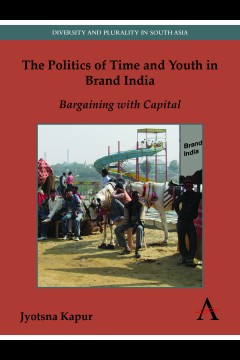The Politics of Time and Youth in Brand India
Bargaining with Capital
By Jyotsna Kapur
Diversity and Plurality in South Asia
- About This Book
- Reviews
- Author Information
- Series
- Table of Contents
- Links
- Podcasts
About This Book
Has India’s shift to neoliberalism since the 1990s led to a heightened awareness of time and its passing, an intense preoccupation with youth, and anxieties over the relations between generations? ‘The Politics of Time and Youth in Brand India’ discusses the politics of time that have emerged in popular discourses across cinema, television, print and consumer culture, arguing that contests over conceptions of time are, in fact, sites of battle between labour and capital.
Kapur shows how the recent political-economic shift in India is accompanied by a new emphasis on youth and a preoccupation with change, novelty and the acceleration of time. This perception of time is examined through an interdisciplinary approach, drawing on critical theory and cinema and media studies, as well as two concepts from Marxist-feminist theory. The first focuses on the notion of capitalist development as a systemic form of underdevelopment, which perpetuates a radicalised individualism while simultaneously erasing selfhood, as each life-time is reduced to homogenous, commodified units of time, each with a varying price dependent upon one’s position in the market. The second is the critique of the time-orientation of capitalism and its promise of freedom through novelty where, in fact, its reliance upon a system of private accumulation based on exploitation favours calculations of profits in the present over investing in the future. Together, these approaches shed light on India’s contemporary cultural politics, explaining how the country’s shift to neoliberalism is deeply intertwined with profound conflicts over conceptions of time, youth and the relations between generations.
Reviews
“Jyotsna Kapur is one of the most brilliant scholars working in the US humanities and social sciences today. This blend of close reading, participant observation and political economy exemplifies her many achievements. This book is marked out by thorough research, clear prose, and pointedness – these chapters have things to say about the great issues of our day.” —Toby Miller, University of California, Riverside
“Even as they unveil the inhumanity of capitalism, these pages sparkle with profound insights and the knowledge that a better world is possible. With this latest book, Kapur has shown herself to be one of the most important thinkers of our time.” —Robin Andersen, Fordham University
“Kapur’s elegantly written book places the media celebration of India’s ‘global generation’ in the context of labor theory and neoliberalism. This highly original work will enrich studies in media, childhood and political economy.” —Ellen Seiter, University of Southern California
Author Information
Jyotsna Kapur is Professor of Cinema Studies and Sociology at Southern Illinois University, Carbondale, USA.
Series
Diversity and Plurality in South Asia
Anthem Global Media and Communication Studies
Anthem South Asian Studies
Table of Contents
Acknowledgments; Introduction: After Me the Flood; Chapter 1: Brand India’s Biggest Sale: The Cultural Politics and Political Economy of India’s “Global Generation”; Chapter 2: Arrested Development and the Making of a Neoliberal State; Chapter 3: For Some Dreams a Lifetime is Not Enough: The “Rasa” Aesthetic and the Everyday in Neoliberalism; Chapter 4: An “Arranged Love” Marriage: India’s Neoliberal Turn and the Bollywood Wedding Culture Industry; Chapter 5: “Ek Haseenah Thi” (There Once Was a Maiden): The Vanishing Middle Class and Other Neoliberal Thrills; Conclusion; Notes; References; Index
Links
Stay Updated
Information
Latest Tweets



